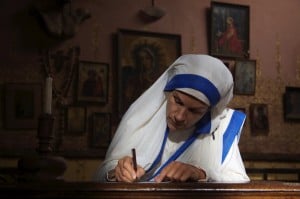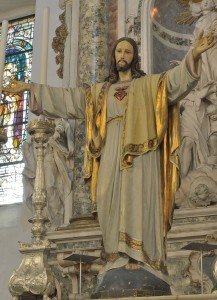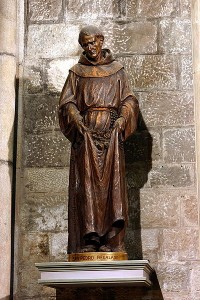On December 30, 717 (or December 30, 720, depending on which source you read), St. Egwin of Evesham, O.S.B. died in Evesham Abbey, the monastery he founded.
So Egwin is the saint of the day–but golly! I’ve never heard of him! So here’s his story:
Egwin was a Benedictine monk and, later, the third Bishop of Worcester in England. A descendant of Mercian kings, possibly a nephew of the pious King Æthelred of Mercia, Egwin was known as a protector of widows and orphans and a fair judge.
He was a stern defender of morality, especially regarding Christian marriage and clerical celibacy. For this he was criticized by some in the Church; and he traveled to Rome, hoping to receive vindication from the Pope.
There are a couple of fanciful legends about the saint:
One story is that as he began his pilgrimage to Rome to meet with the Pope, Egwin shackled his feet in irons and threw the key into the River Avon in England. Once in Rome, he stopped to pray at the tomb of the Apostles. There, one of Egwin’s servants brought him the same key–which had, according to legend, been found in the mouth of a fish which had just been caught in Rome’s Tiber River. Egwin unshackled his feet and went directly to visit the Pope, who immediately exonerated him for his defense of Catholic practices, thereby silencing his critics.
Another story tells of his travels through the Alps en route to Rome. At one point, Egwin and his companions became thirsty. His detractors–those among his traveling companions who did not recognize his great personal sanctity–mocked him, asking him to pray for water as Moses once did in the desert. But those who did believe in him responded by rebuking the unbelievers. They petitioned Egwin with true faith and hope, asking him to pray for water.
Egwin lay prostrate on the ground in prayer. When he arose, a pure stream of water gushed forth from the rock, providing water for all.
When he returned to England, Egwin founded Evesham Abbey, one of the great Benedictine houses of medieval Europe.
It’s believed that one of his last official duties as a bishop was participation in a great synod, the Council of Clovesho, in July 716. At that council, King Wihtred of Kent issued a code of laws known as the Law of Wihtred, which has been preserved in a manuscript known as the Textus Roffensis. The laws pay a great deal of attention to the rights of the Church, including punishment for irregular marriages and for pagan worship.











